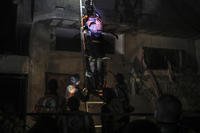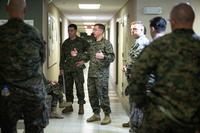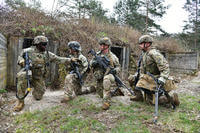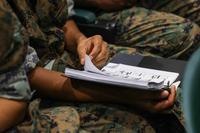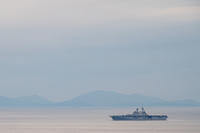
Colin has a great commentary from ousted Air Force secretary Mike Wynne over at DoD Buzz on how the West should respond to Russia's invasion of Georgia.
Here's an excerpt:
The Russian incursion in Georgia raises fundamental questions about Western policy responses and the tools available to support Western policy. Russian actions can not be a surprise to the West; The Georgian People spoke out at least two weeks prior, and it takes time to move troops into and out of the tunnel separating Ossetia and Georgia. Also; where was the verification from the media? Where were the satellite images of the destruction of the town in Ossetia that has been heavily propagandized to support the two pronged invasion? All this makes one wonder about the reality of the event. The ability of the Georgians to see and broadcast the event was blinded by the Russian shootdown of the Georgian UAV weeks earlier.
In hindsight, the Russians sent many signals, yet those signals seemingly were ignored or set aside. What is real is the recognition of the two breakaway provinces,and de-facto occupation of the port city.
Russian actions challenge the West to revisit its ability to defend the states bordering Russia, including the new states of NATO, against Russian military petro-power. Beyond Georgia or Europe, there is the question of the credibility of Western responses to states like Russia that take into their own hands the fate designing borders.
After all, the invasion of Kuwait by Saddam Hussein led to a unified Western response to restore the territorial integrity of Kuwait. But to do this required a 6-month military buildup before a response could be generated.
Can we not do better now in providing appropriate military tools for Western decision-makers? We need tools or force packages which let states like Russia know that their actions will not go unobserved or unmitigated. We need flexible tools for ambiguous situations so that Western decision-makers can make NATO a serious enterprise.
How might have we responded and what can we do now? We could have flown Global Hawks or U2s on the Russian-Georgian border to signal our watchfulness to the Russians. We could have escorted these assets with the F-22s, which fly at high enough altitude to operate as a defense of unmanned assets, or can operate to defend key assets in Georgia. If the Russians determined to invade, we could have strengthened air defenses of key Georgian positions, provided fighter re-enforcements, and placed special forces or Marines on the ground in the national capital. We need to strengthen our capability to shape flexible force packages which can generate firebreak messages rapidly and effectively. And Europe, under the leadership of President Sarkozy, could shape their military capabilities to inject similar force structure capabilities to shape choices and limit Russian options.
With regard to the new states, I have written elsewhere about the need to shape cyberwarriors to defend against Russian attacks, and we need to enhance their ability to provide for air and tank defenses through providing aid to the new states in Europe. When considering Ukraine, we need to discuss with their leadership how they would like to enhance their defenses against external threats. In the 1980s, West Europeans discussed the need to enhance the tools for defensive defense. Such tools are stronger now, ranging from cyber to ground and air defenses. Europe, as well as American industry, has appropriate technologies at hand to assist endangered states to provide firebreak defenses against a Russia which thinks its petrol interests will block the will of the West to respond.
Read the rest of Wynne's commentary HERE.
-- Christian



